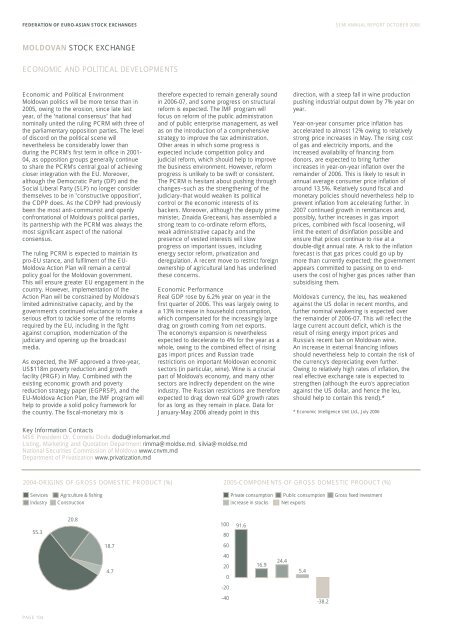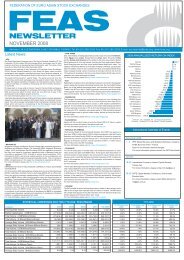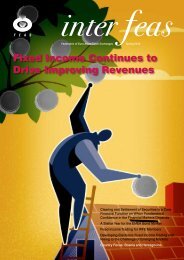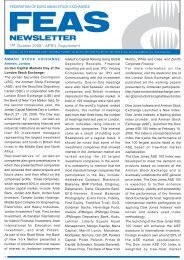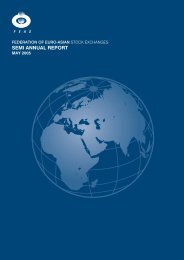Download - FEAS
Download - FEAS
Download - FEAS
Create successful ePaper yourself
Turn your PDF publications into a flip-book with our unique Google optimized e-Paper software.
FEDERATION OF EURO-ASIAN STOCK EXCHANGES SEMI ANNUAL REPORT OCTOBER 2006<br />
MOLDOVAN STOCK EXCHANGE<br />
ECONOMIC AND POLITICAL DEVELOPMENTS<br />
Economic and Political Environment<br />
Moldovan politics will be more tense than in<br />
2005, owing to the erosion, since late last<br />
year, of the "national consensus" that had<br />
nominally united the ruling PCRM with three of<br />
the parliamentary opposition parties. The level<br />
of discord on the political scene will<br />
nevertheless be considerably lower than<br />
during the PCRM's first term in office in 2001-<br />
04, as opposition groups generally continue<br />
to share the PCRM's central goal of achieving<br />
closer integration with the EU. Moreover,<br />
although the Democratic Party (DP) and the<br />
Social Liberal Party (SLP) no longer consider<br />
themselves to be in "constructive opposition",<br />
the CDPP does. As the CDPP had previously<br />
been the most anti-communist and openly<br />
confrontational of Moldova's political parties,<br />
its partnership with the PCRM was always the<br />
most significant aspect of the national<br />
consensus.<br />
The ruling PCRM is expected to maintain its<br />
pro-EU stance, and fulfilment of the EU-<br />
Moldova Action Plan will remain a central<br />
policy goal for the Moldovan government.<br />
This will ensure greater EU engagement in the<br />
country. However, implementation of the<br />
Action Plan will be constrained by Moldova's<br />
limited administrative capacity, and by the<br />
government's continued reluctance to make a<br />
serious effort to tackle some of the reforms<br />
required by the EU, including in the fight<br />
against corruption, modernization of the<br />
judiciary and opening up the broadcast<br />
media.<br />
As expected, the IMF approved a three-year,<br />
US$118m poverty reduction and growth<br />
facility (PRGF) in May. Combined with the<br />
existing economic growth and poverty<br />
reduction strategy paper (EGPRSP), and the<br />
EU-Moldova Action Plan, the IMF program will<br />
help to provide a solid policy framework for<br />
the country. The fiscal-monetary mix is<br />
therefore expected to remain generally sound<br />
in 2006-07, and some progress on structural<br />
reform is expected. The IMF program will<br />
focus on reform of the public administration<br />
and of public enterprise management, as well<br />
as on the introduction of a comprehensive<br />
strategy to improve the tax administration.<br />
Other areas in which some progress is<br />
expected include competition policy and<br />
judicial reform, which should help to improve<br />
the business environment. However, reform<br />
progress is unlikely to be swift or consistent.<br />
The PCRM is hesitant about pushing through<br />
changes–such as the strengthening of the<br />
judiciary–that would weaken its political<br />
control or the economic interests of its<br />
backers. Moreover, although the deputy prime<br />
minister, Zinaida Greceanii, has assembled a<br />
strong team to co-ordinate reform efforts,<br />
weak administrative capacity and the<br />
presence of vested interests will slow<br />
progress on important issues, including<br />
energy sector reform, privatization and<br />
deregulation. A recent move to restrict foreign<br />
ownership of agricultural land has underlined<br />
these concerns.<br />
Economic Performance<br />
Real GDP rose by 6.2% year on year in the<br />
first quarter of 2006. This was largely owing to<br />
a 13% increase in household consumption,<br />
which compensated for the increasingly large<br />
drag on growth coming from net exports.<br />
The economy's expansion is nevertheless<br />
expected to decelerate to 4% for the year as a<br />
whole, owing to the combined effect of rising<br />
gas import prices and Russian trade<br />
restrictions on important Moldovan economic<br />
sectors (in particular, wine). Wine is a crucial<br />
part of Moldova's economy, and many other<br />
sectors are indirectly dependent on the wine<br />
industry. The Russian restrictions are therefore<br />
expected to drag down real GDP growth rates<br />
for as long as they remain in place. Data for<br />
January-May 2006 already point in this<br />
direction, with a steep fall in wine production<br />
pushing industrial output down by 7% year on<br />
year.<br />
Year-on-year consumer price inflation has<br />
accelerated to almost 12% owing to relatively<br />
strong price increases in May. The rising cost<br />
of gas and electricity imports, and the<br />
increased availability of financing from<br />
donors, are expected to bring further<br />
increases in year-on-year inflation over the<br />
remainder of 2006. This is likely to result in<br />
annual average consumer price inflation of<br />
around 13.5%. Relatively sound fiscal and<br />
monetary policies should nevertheless help to<br />
prevent inflation from accelerating further. In<br />
2007 continued growth in remittances and,<br />
possibly, further increases in gas import<br />
prices, combined with fiscal loosening, will<br />
limit the extent of disinflation possible and<br />
ensure that prices continue to rise at a<br />
double-digit annual rate. A risk to the inflation<br />
forecast is that gas prices could go up by<br />
more than currently expected; the government<br />
appears committed to passing on to endusers<br />
the cost of higher gas prices rather than<br />
subsidising them.<br />
Moldova's currency, the leu, has weakened<br />
against the US dollar in recent months, and<br />
further nominal weakening is expected over<br />
the remainder of 2006-07. This will reflect the<br />
large current account deficit, which is the<br />
result of rising energy import prices and<br />
Russia's recent ban on Moldovan wine.<br />
An increase in external financing inflows<br />
should nevertheless help to contain the risk of<br />
the currency's depreciating even further.<br />
Owing to relatively high rates of inflation, the<br />
real effective exchange rate is expected to<br />
strengthen (although the euro's appreciation<br />
against the US dollar, and hence the leu,<br />
should help to contain this trend).*<br />
* Economic Intelligence Unit Ltd., July 2006<br />
Key Information Contacts<br />
MSE President Dr. Corneliu Dodu dodu@infomarket.md<br />
Listing, Marketing and Quotation Department rimma@moldse.md, silvia@moldse.md<br />
National Securities Commission of Moldova www.cnvm.md<br />
Department of Privatization www.privatization.md<br />
2004-ORIGINS OF GROSS DOMESTIC PRODUCT (%)<br />
2005-COMPONENTS OF GROSS DOMESTIC PRODUCT (%)<br />
Services<br />
Agriculture & fishing<br />
Private consumption Public consumption Gross fixed investment<br />
Industry<br />
Construction<br />
Increase in stocks<br />
Net exports<br />
55.3<br />
20.8<br />
100<br />
80<br />
91.6<br />
18.7<br />
60<br />
4.7<br />
40<br />
20<br />
0<br />
16.9<br />
24.4<br />
5.4<br />
-20<br />
-40<br />
-38.2<br />
PAGE 104


